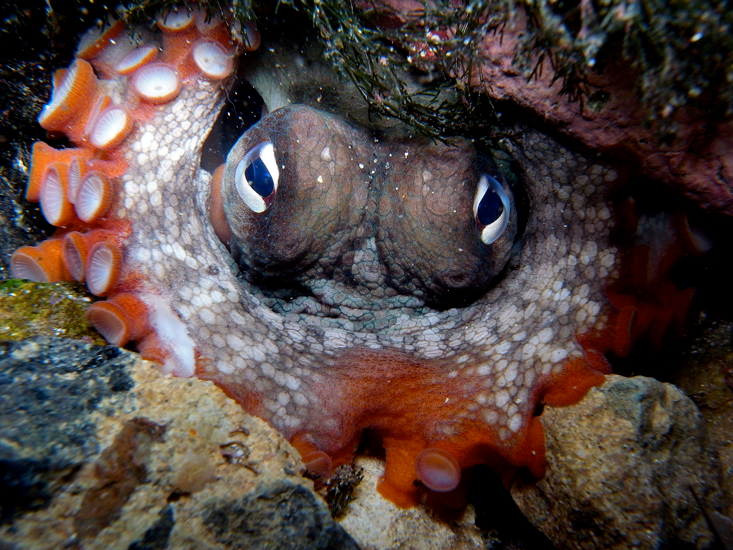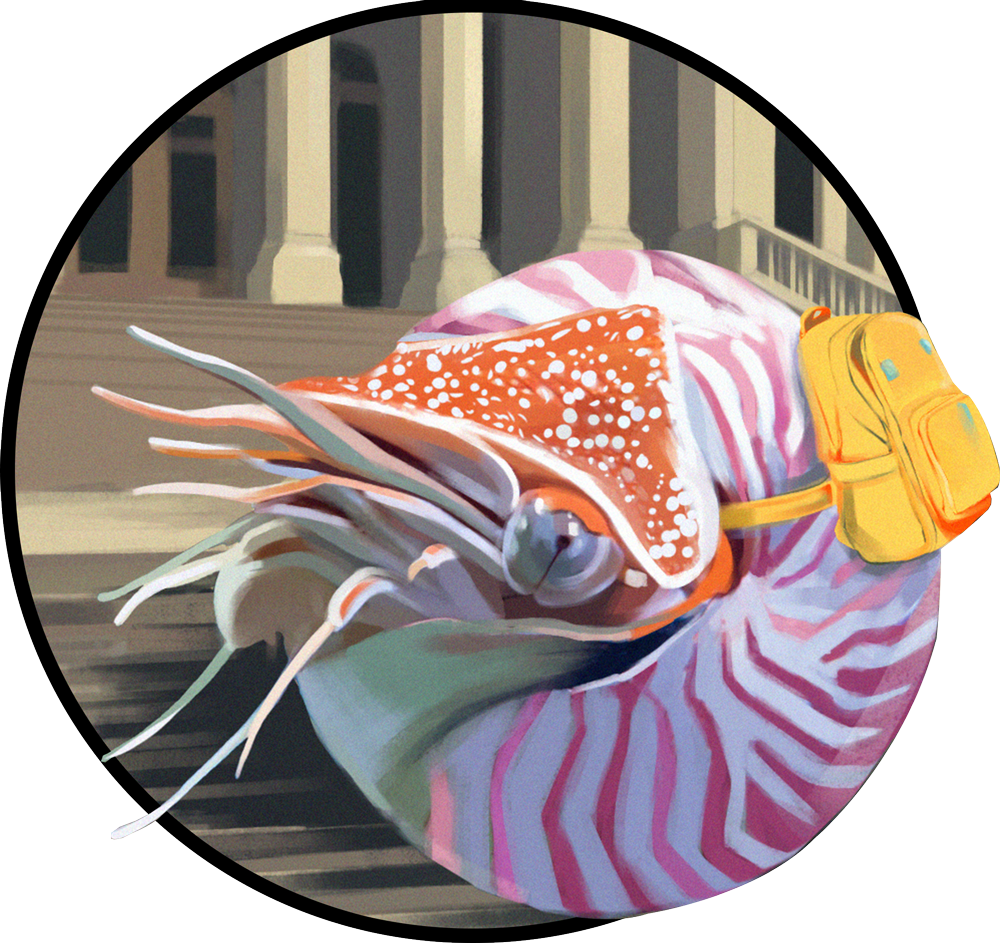Last January I was walking with my granddaughter along a beach near Melbourne when we noticed several people gathered around a rock pool, peering into the water. Wondering what had attracted their attention, we went over and saw that it was an octopus. If the spectators were interested in it, it also seemed interested in them. It came to the edge of the pool, one of its eyes directed at the people above, and stretched a tentacle out of the water, as if offering to shake hands. No one took up the offer but at least no one tried to capture the animal or turn it into calamari. That was pleasing because, as Peter Godfrey-Smith says in his recent book Other Minds: The Octopus, the Sea, and the Deep Origins of Consciousness, an octopus is “probably the closest we will come to meeting an intelligent alien.”
If we do ever meet an intelligent alien, even a tasty one, I hope we have sufficient ethical awareness to think of more than pleasing our palates or filling our stomachs. My view that this would be the wrong way to respond to such an encounter, however, leads to a deeper question: What moral status would extra-terrestrials have? Would we have obligations to them? Would they have rights? And would our answers depend on their intelligence?
These questions bring to mind Steven Spielberg’s celebrated 1982 movie E.T. the Extra-Terrestrial. In case you haven’t seen the film, it features a friendly extraterrestrial who lands on Earth with some colleagues on a botanical research expedition and is accidentally left behind. E.T. is befriended by Elliott, a 10-year-old boy, and soon shows that he has a full range of human-like feelings, including homesickness. He also has greater compassion for other species than most humans do. In one memorable scene, Elliott, moved by feelings that come from E.T., liberates the frogs in his biology class.
I use E.T. as a thought-experiment to challenge students to reconsider their speciesism—the still widely held assumption that the boundary of our species is also the boundary of beings with rights, or with interests that we ought to take seriously. So far, the only nonhumans we have encountered are animals, plants, fungi, and microscopic living things such as protozoans, bacteria, algae, and spirochetes. When we consider the moral status of these organisms, our thinking is likely to be biased by our own interests in using them, especially as sources of food, or in avoiding being made ill by them.
This is clearest when we think about how we ought to treat nonhuman animals. We have deeply embedded customs of killing and eating animals and using their skins for fur and leather. Many people can hardly imagine a meal without meat or other animal products. Religious and philosophical thinkers are as susceptible to bias as other people, and so most of them have justified this practice. In doing so, these thinkers have dug a broad gulf in our minds between ourselves and nonhuman animals. Even the term “nonhuman animals” sounds odd, because it implies that we are animals. It should not sound odd at all, because we have known, ever since Darwin, that we are animals. Yet we persist in thinking that we are a separate creation, that we alone are made in the image of God, or that we alone have an immortal soul.
It might be difficult to tell whether extraterrestrial life forms are capable of suffering or experiencing happiness.
E.T. challenges the moral significance of the species boundary both because we recognize in him a being with feelings very like ours, and because we have no prejudice against him based on a history of eating his kind, putting them in circuses for our amusement, or using them as beasts of burden. So if I ask my students, “Would it have been ethically permissible for scientists to kill E.T. and dissect him for the purposes of what would surely be extremely interesting scientific research?” they unanimously reject that idea. Some things that we could do to harm aliens, they concede, are wrong. If they accept that, then they must also accept that the sphere of proper ethical concern is not limited to members of the species Homo sapiens.
Accepting that it would be wrong to kill and dissect E.T. is a first step in exploring our ethical obligations to extraterrestrial life, but it does not take us very far. Perhaps we have ethical obligations only to beings who have a high level of intelligence, self-awareness, or communicative ability, and if we ever discover extraterrestrial life lacking in these qualities, we will have no obligations to them.
Once the species-barrier has been breached, however, it is not so easy to fall back on the requirement that a being pass some threshold for cognitive abilities in order to have rights. For then we have to consider human beings who fail that test—as both human infants, and humans with profound intellectual disability, do. Surely they have interests that need to be considered, whether or not they possess, or have the potential to develop, higher cognitive capacities.
Most of us now accept that we have at least some obligations to avoid inflicting suffering on nonhuman animals, and the same would surely hold for any extraterrestrial beings who we discover to be capable of suffering. In my view, pain and suffering are equally bad, no matter what the species, or planetary origins, of the being suffering. The only thing that matters is the intensity and duration of the suffering. I would make a similar claim about pleasure and happiness. We can think of this as a form of equality—equal consideration for similar amounts of suffering or happiness.

It might, however, be difficult to tell whether extraterrestrial life forms are capable of suffering or experiencing happiness. We recognize the suffering of other beings by analogy with our own. Where there is a nervous system sufficiently like ours, and behavior similar to our responses to pain, it is reasonable to assume that a nonhuman animal is experiencing pain. This reasoning is strengthened by our knowledge that we and nonhuman animals have a common evolutionary origin, because it is plausible that the mechanisms that we share with other animals work in similar ways.
The further back our evolutionary divergence from another being was, the more difficult it is to establish whether consciousness is present. That is why an encounter with an octopus is so fascinating. The behavioral evidence, not only for consciousness but also for intelligence is very strong— just go to YouTube and search for “octopus intelligence” and you will find many videos of octopuses solving novel problems as well as learning how to do things by observing how another, more experienced, octopus goes about it. Yet our last common ancestor with the octopus was a worm-like creature living 600 million years ago, long before there were any minds at all on this planet. So mind has evolved twice—at least—on this planet. Perhaps if we do encounter extraterrestrial organisms that might have minds, we can use behavioral tests, as we do with the octopus and other cephalopods, to determine whether it is probable that they really are conscious.
If there are reasonable grounds for believing that a being may be capable of suffering, we should, wherever possible, give that being the benefit of the doubt. That means applying the principle of equal consideration, but with a discount for uncertainty.
Albert Schweitzer famously advocated an ethic of “reverence for life” and some deep ecologists hold that rivers and mountains have intrinsic value. We don’t need to go to those lengths in order to see that the existence of another mind—another center of consciousness—places moral demands on us. If there is something that it is like to be another being, then we have a moral responsibility to avoid harming that conscious being, and, in so far as it is within our power and a reasonable use of our resources, to make that being’s life go as well as possible.
Peter Singer is a professor of bioethics at Princeton University and Laureate Professor at the University of Melbourne. His books include Animal Liberation, The Life You Can Save, The Most Good You Can Do and, most recently, Ethics in the Real World.




























